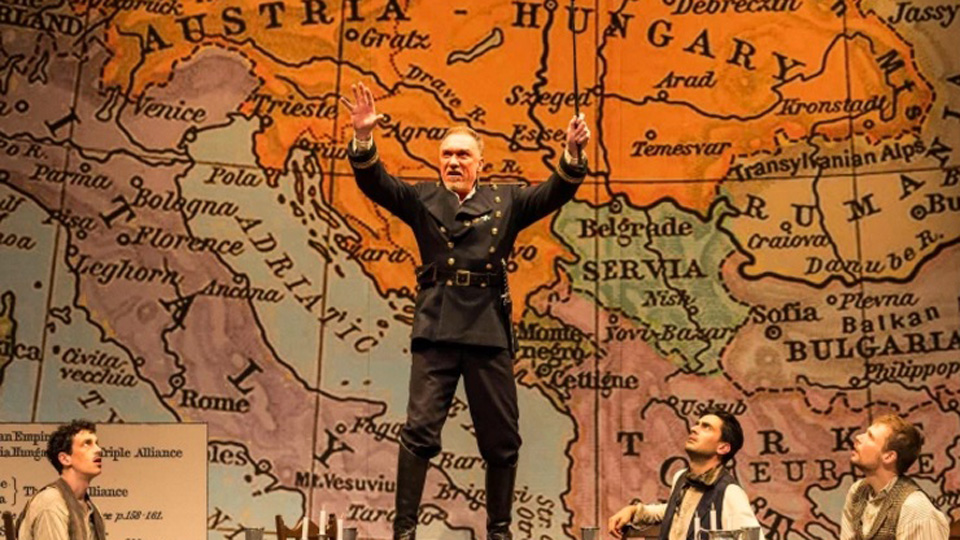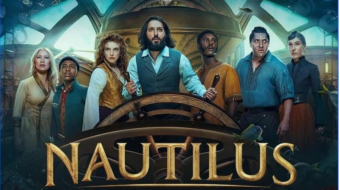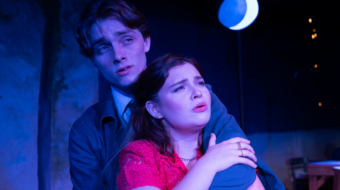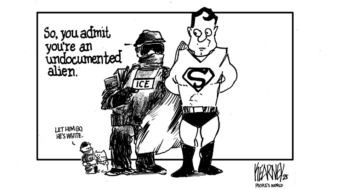
LOS ANGELES—In the early 1980s, when the AIDS epidemic broke out, thousands of people received a diagnosis that amounted to a death sentence. Pundits speculated that these diseased pariahs were ideal candidates to carry out targeted assassinations of the scum of humankind—corrupt government leaders, corporate villains, anti-gay religious zealots and the like. For a moment or two we held our breath waiting to see if someone might answer this high calling. It never happened.
The new play Archduke, commissioned from playwright Rajiv Joseph by The Mark Taper Forum and now receiving its world premiere production there, advances a similar premise: That a trio of tubercular members of the Slavic lumpen proletariat are recruited in the name of Serbian nationalism to assassinate Austro-Hungarian Archduke Franz Ferdinand and his wife Sophie, Duchess of Hohenberg, when they arrive on June 28, 1914, in Sarajevo, capital of Bosnia and Herzegovina in what is now independent Bosnia, formerly a republic of socialist Yugoslavia (which had started off as a kingdom after World War I), and before that a province of the Austro-Hungarian Empire.
Why was the Mark Taper so interested in playwright Rajiv Joseph? Well, his play Bengal Tiger at the Baghdad Zoo premiered at one of the Center Theatre Group’s venues, the Kirk Douglas Theatre, in 2009 before moving to the Taper in 2010 and Broadway in 2011. It was a 2010 Pulitzer Prize finalist for Drama and was also awarded a grant for Outstanding New American Play by the National Endowment for the Arts. A major new play by Joseph is a feather in any company’s cap. His return to the Taper is a heralded event in L.A. theatre history.
There is much historicity to the tale Joseph spins. There was indeed a secret Serbian nationalist group known as the Black Hand under the leadership of one Dragutin Dimitrijevic, who did recruit followers to commit the assassinations which have gone down in history as the spark that set off the more than four-year-long holocaust of WWI. Joseph’s six actors play eight characters, of whom only two are total fiction.
The question so many people in the world today are asking is: What does it take to turn an ordinary person into a terrorist or assassin? Merely a sincerely held belief in a noble cause? Insecurity about one’s manhood? A desire for the martyr’s posthumous glory?
Joseph reflected on WWI, saying, “The people involved and the nations involved and the conflicts involved were not contemporary in any way, shape or form. But I think it’s useful to look at how politics, power, individuals, humanity—these things change a lot less than we give them credit for. I hope people leaving the theatre will be talking about how similar our situation might be to a few 19-year-old Serbian guys in 1914.”
Furthering that thought about contemporary resonance, Joseph continued, “There’s a real sense of uncertainty and dread that is part of our national conversation now, which plays into the relevance of this play.”
Calamity into slapstick
Judging from the three plays I have seen of his, Joseph assumes a tragicomic stance toward everything. There is no disaster or calamity that cannot be turned into comedic antics even of the most slapstick order. Archduke is no exception.
The troika of assassins include Gavrilo Princip, Trifko Grabež and Nedeljko Čabrinović (Joseph refers to them only by their first names). In Joseph’s conceit, these three sad-sack maladroits occupy a space somewhere within the intellectual territory of the humanistic Charlie Chaplin, the anarchic Marx Brothers and the idiotic Three Stooges.
When intellectuals contemplate their fellow creatures inhabiting the lower depths of society, they tend to assume their interests and values begin and end with their stomachs and their genitals. So it is with Gavrilo, Trifko and Nedeljko, to comic effect. A tasty warm sandwich is of greater importance right now than any lofty ideal of Serbian nationalism. Finding some women in Sarajevo who can relieve them of their virginity might rate higher than killing some archduke they never heard of.
But these verbal and sight gags long exceed their welcome. As for the Captain’s overheated speeches about Serbian nationalism and the suffocating grip of Austro-Hungary, these are also made darkly comic, a premonition of Hitler who would emerge in the next decade.
It’s okay to dabble with history as your starting point for drama. Hey, Shakespeare did that all the time. And don’t get me started on opera librettists. Archduke may be the playwright’s statement on the ways people are recruited for terrorism, the excesses of nationalism and ethnic chauvinism, the folly of war, all these ideas. But please let us not accept that this play has much to do with the causes and origins of WWI, which happened, after all, not that long ago! Here are a couple of reasons why not.
As always, the national question
Historians often speak of the bias of “presentism,” which says that history matters only insofar as it reflects on the issues we are dealing with today. Concerns specific to the period are swept under the rug.
It’s a kind of “presentism,” then, to portray nationalism only in its most absurd, violent, hyperventilated form, the Captain foaming at the mouth over the mortal offense given to the proud Slavic people of Serbia by the predatory usurping royal family of Austro-Hungary. He is an early avatar of later 20th-century fascist types who have besmirched the name of nationalism.
Now I am no great defender of nationalism as such. But consider the world in 1914. Joseph focuses on the Austro-Hungarian empire that is oppressing the Serbs, but there were also the Russian, the British, the French, German, Dutch, Portuguese and the Ottoman empires, not forgetting the new American one following Spain’s defeat in 1898.
In these vast hegemonic empires, diverse peoples were struggling for national identity, rights, recognition, and if possible, independence. We are talking about national entities which did not exist in 1914 such as Finland, Poland, Czechoslovakia, Hungary, the Baltic countries; in the Ottoman world, Iraq, Syria, Lebanon, Saudi Arabia. These national groups wanted their own languages, their own press, literature, theatre and schools, their own parliaments, elections, taxes, monetary systems and defense, their seat at the world table. These were achieved in the post-WWI breakup of those empires.
Only after World War II were most of the other colonial possessions in Africa and Asia put on a path toward independence, in some cases only after violent revolutions. Some, perhaps most, fell into what we might call a neo-colonial status, formally independent, but subject to the whims of the former metropolis, while others, such as Puerto Rico, were never set free.
These were legitimate concerns on the historical agenda in 1914. It’s easy to poke at Serbian nationalism and a self-important tinpot henchman, but that’s not the way the world looked then.
As a side point to the nationalism question, Joseph portrays Gavrilo Princip as a helpless and hungry servile bumpkin, along with his equally clueless companions Trifko and Nedeljko, able to be seduced by Dimitrijevic into the Serbian national project. But in fact, Princip was already a committed Bosnian Serb member of Young Bosnia, a Yugoslavist organization seeking to end Austro-Hungarian rule. After the war the Kingdom of Yugoslavia was indeed created, so Princip did reach his goal, although he died in prison in April of 1918, several months before the war ended.
One could also convincingly argue that these immense imperial states, armed to the teeth, conducting highly visible military maneuvers that looked very much like rehearsals, and staring each other down over borders that erased national identity, were itching for war to expand their power and capture new markets, not only in Europe but globally. Any spark could have—and would have—sent this tinderbox into flames. The assassinations in Sarajevo were but the signal that for all practical purposes the war had already begun.
Having said all of which, did I enjoy the play? Yes, I did! It bubbles along in Giovanna Sardelli’s secure, tight direction. The cast includes Stephen Stocking as Gavrilo, Ramiz Monsef as Trifko, Josiah Bania as Nedeljko, Patrick Page as Dimitrijevic, Todd Weeks as the fictional TB Dr. Leko, and Joanne McGee as the Captain’s fictional cook Sladjana, incidentally the only character in the play with an identifiable accent—she’s a kind of Slavic witch not especially sympathetic to her employer’s nationalist fantasies. The would-be assassins speak in American urban tough-guy tones.
The creative team includes a sensational scenic design by Tim Mackabee, costume design by Denitsa Bliznakova, atmospheric lighting by Lap Chi Chu, music and sound by Daniel Kluger.
Even if somewhat ahistorical, it’s not meant to be a documentary. It’s funny and engaging, with laughs galore, and a wistful empathy for the severely uneducated. From a purely theatrical point of view, it entertains both mentally and physically.
Archduke plays through June 4 at the Center Theatre Group/Mark Taper Forum, 135 N. Grand Ave., Los Angeles 90012. For tickets and information, please visit CenterTheatreGroup.org or call (213) 628-2772.










